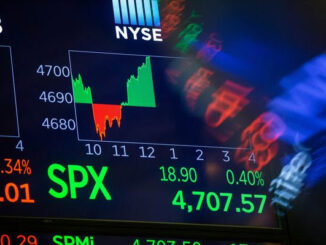
It’s Climate Week in New York City and the financial capital is responding to more ESG backlash. While the acronym ESG stands for “environmental, social, and governance,” what it means depends on who you ask.
Earlier this year, to take one example, the name of investment manager Federated Hermes appeared on the website of the State Financial Officers’ Foundation as a “sponsor,” alongside oil-industry stalwarts Wells Fargo, JP Morgan and Fidelity Investments, according to the news organization Responsible Investor. The foundation is a conservative organization leading an anti-ESG movement. At the time, it was conducting a review of firms that are said to boycott the fossil fuels industry. On Friday, Federated Hermes said that it will no longer sponsor the SFOF. A statement on the foundation’s website now says it does not discuss or disclose its donors.
The backlash tussle is often attributed to American culture wars, but there are powerful, more nuanced forces at work. ESG wasn’t born in the U.S., and it wasn’t intended as a values-based decision-making process.
ESG originated at the United Nations in 2005. Contrary to what we see today, it was intended to be an evidence-based process. Its differentiating factor was to avoid mixing values with investments—as was the case with its predecessor, socially responsible investments, or SRI.
Responsible, ethical, or “good” investments are not new. Depending on what search terms you enter, these date back millennia. Religious institutions have long-standing investment guidelines to avoid birth control, abortions and weapons of mass destruction. The Pax World Balanced Fund launched in 1971 was largely aimed at religious investors.
Operationally, SRI leans heavily on explicit exclusion or inclusion of stocks, or industries deemed to be “bad” or “good”—according to the values of the client.
ESG was meant as the antidote to SRI.
According to the U.N.’s Principles for Responsible Investment, ESG calls upon investment professionals to “understand the investment implications of environmental, social and governance factors,” and to “incorporate these factors into investment decisions.” The call is to question the assumptions inherent in financial projections. Chief among these is that the planet’s life-sustaining environment will continue indefinitely.
Scientists at the Intergovernmental Panel on Climate Change have said that given all the promises and policies we have in place today, there is a 99% probability that our planet will be hostile to most life forms by the end of this century. That is science. Ignoring facts is a personal value choice.
Eighteen years ago when the United Nations encouraged financial professionals to understand environmental impacts on profits, they were addressing a generation who had no training in climate sciences. This remains largely true today, despite high demand for people with environmental education. It was a tall order, and perhaps a bit unfair to the profession, consumers and companies.
Earlier this year Elon Musk took to Twitter , voicing outrage at the fact Tesla , the car company that has led the electric-vehicle revolution was omitted from S&P’s list of top ESG companies, while Exxon had been included.
According to S&P’s methodology paper, the S&P 500 top ESG names are selected with a process that starts with an exclusion of companies in “controversial weapons, thermal coal, tobacco, oil sands, small arms and military contracting.” From there, companies are ranked against each other and further exclusions are made. Their exclusion based process resembles an SRI index—not ESG.
ESG indexes use bespoke processes to produce a single number for each company. But those assessments lump together disparate environmental, social and governance factors. It’s unclear what that final number communicates. It is also unclear whether the rankings measure climate change’s impact on profits—or the company’s impact on the environment.
If ESG is a call to understand the impact of exogenous factors on companies, industries and countries, then a single score is a gross oversimplification. If ESG were ultimately intended just to raise enough awareness in order to stoke action, then the backlash is a sign we have an excellent beginning.
The stark change in rhetoric from the oil industry is a glimpse into the profound structural changes taking place in the global economy. Gone are the aggressive marketing campaigns to cast doubt on the credibility of scientists. Today, oil companies acknowledge the climate crisis and their marketing departments spin emissions targets. Even one of America’s oldest and largest oil exploration companies, Occidental Petroleum , is trying to convince consumers that its oil is less carbon-intensive.
The consumer pressure is staggering.
Consumer Reports data show that 71% of Americans have some interest in buying an electric vehicle even as only 46% are aware of government tax incentives for them.
Data from the Yale Program on Climate Change Communication shows that 65% of people in the U.S. are worried about global warming, 66% want fossil fuel companies to pay a carbon tax and 72% want legislation to regulate carbon emissions as a pollutant.
A report on consumer preferences from analytics provider FirstInsight shows that sustainability beats out brand names of products across all generations. Large majorities of all generations are willing to spend at least 10% more for sustainable products.
Flows into ETFs with ESG mandates have gone from less than $10 billion in 2015 to over $40 billion in 2020. Total global assets under management with an ESG mandate have reached close to $40 trillion from about $20 trillion in 2016. Growth is expected to continue, reaching $50 trillion by 2025, representing over a third of total global AUM.
The 2022 World Wealth Report from consultants Capgemini shows that 55% of high-net-worth investors want their investments to have positive environmental, social and governance impacts. And as confusing as ESG scores might be, 78% of ultra-high-net-worth investors are likely to request an ESG score from their wealth manager.
Beginnings are messy, and ESG will need to mature. But it is here to stay.



